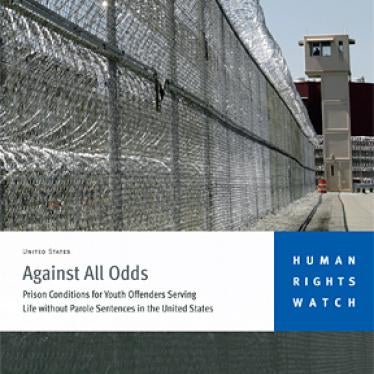(New York) – The approximately 2,570 youth offenders serving life without parole sentences in adult US prisons experience conditions that violate fundamental human rights, Human Rights Watch said in a report released today. The United States is the only country in the world with youth offenders (below the age of 18 at the time of offense) serving life without parole sentences. The US Supreme Court will consider arguments about the constitutionality of the practice in March 2012.
The 47-page report, “Against All Odds: Prison Conditions for Youth Offenders Serving Life without Parole Sentences in the United States,” draws on six years of research, and interviews and correspondence with correctional officials and hundreds of youth offenders serving life without parole. Human Rights Watch found that nearly every youth offender serving life without parole reported physical violence or sexual abuse by other inmates or corrections officers. Nationwide statistics indicate that young prisoners serving any type of sentence in adult prison, as well as those with a slight build and low body weight, are most vulnerable to attack.
“Children who commit serious crimes and who inflict harm on others should be held accountable,” said Alison Parker, director of the US program at Human Rights Watch and co-author of the report. “But neither youth offenders, nor any other prisoner, should endure any form of physical abuse.”
This new research sheds light on the severity of prison conditions for those serving this sentence, Human Rights Watch said.
“[I was] scared to death,” said a youth offender serving life without parole in California. “I was all of 5’6”, 130 pounds and they sent me to PBSP [Pelican Bay State Prison]. I tried to kill myself because I couldn’t stand what the voices in my head was saying…. ‘You’re gonna get raped.’ ‘You won't ever see your family again.’”
Youth offenders are serving life without parole sentences in 38 states and in federal prisons. They often enter adult prison while still children, although some have reached young adulthood by the time their trials end and they begin serving their sentences. Prison policies that channel resources to inmates who are expected to be released often result in denying youth serving life without parole opportunities for education, development, and rehabilitation, Human Rights Watch found.
Youth offenders commonly reported having thoughts of suicide, feelings of intense loneliness, or depression. Isolation was frequently compounded by solitary confinement. In the past five years, at least three youth offenders serving life without parole sentences in the United States have committed suicide.
While the report found numerous examples in which prison conditions had caused harm to youth offenders, there were also several examples of youth who had been able to continue their education, and showed evidence of rehabilitation and a desire to contribute to society if ever released.
The federal government and the states should abolish the sentence of life without parole for crimes committed by children, Human Rights Watch said. Government officials responsible for youth offenders should reform confinement conditions to accommodate their particular vulnerabilities, needs, and capacities to mature, reflect upon the harm they have caused, and change.
“Because children are different, shutting the door to growth, development, and rehabilitation turns a sentence of life without parole into a punishment of excessive cruelty,” said Parker. “Youth offenders should be given a path to rehabilitation while in prison – not forced to forfeit their future.”
Accounts from the report:
Sexual and physical violence
“When I was young, it was disorienting and scary, like a fish thrown in water not knowing how to swim. Everyone seemed big and dangerous and threatening, I was challenged and intimidated a lot. Canines [sexual predators] stalked me, and at all times I expected to be attacked.”
– Tyler Y. (pseudonym), serving life without parole in Colorado
Lack of educational opportunities
“LWOPs cannot participate in many rehabilitative, educational, vocational training or other assignments available to other inmates with parole dates…. The supposed rationality is that LWOPs are beyond salvagability and would just be taking a spot away from someone who will actually return to society someday.”
– Darryl T. (pseudonym), youth offender serving life without parole in California
Desire to contribute to society
“I would be ever grateful… for the chance to spend my life now for some good reason. I would go to the most dangerous parts of Afghanistan…or jump on the first manned mission to Mars…. [I]f the state were to offer me some opportunity to end my life doing some good, rather than a slow-wasting plague to the world, it would be a great mercy to me.”
– Troy L. (pseudonym), youth offender serving life without parole in Arkansas






